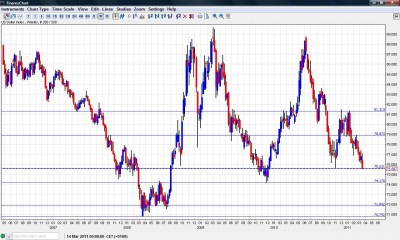The roller coaster week ended badly for the US dollar, as the US Dollar Index closed at the lowest levels since December 2009, just under the previous low. Will it bounce back up from here, or is it a fast roll downhill from here? 5 arguments for the dollar, and 5 against it.
Background
The rise of oil prices in recent weeks, following the Libyan civil war and the unrest all over the Middle East, sent the dollar lower across the board. This was evidently seen against the Swiss franc, which returned to its role as the ultimate safe haven currency.
And then we got another acceleration, following the horrific earthquake in Japan. The yen strengthened against the greenback on speculation that Japanese companies will need to make mass repatriations. When the historic low of USD/JPY at 79.75 was broken, the pair collapsed quickly.

The intervention by the G-7 countries sent USD/JPY back up above 80, but it didn’t go too far eventually. As the European made a bigger effort to buy EUR/JPY than the Americans did on USD/JPY, we got a breakout of EUR/USD as a side effect. Other currencies also enjoyed dollar weakness.
The result: the US dollar index is 75.567, just under the previous low of 75.631 recorded in November, after QE2 was announced. It’s now at levels last seen in December 2009.
Where now?
This breakout isn’t confirmed yet. It actually happened in the late hours of Friday, and the dip below the previous low is marginal. So will it bounce back from this low? Here are a few reasons to support the dollar:
- Intervention will succeed: Japan suffered from a weak economy even before the earthquake and this terrible catastrophe, together with a joint wide international effort, will eventually weaken the yen, also against the US dollar.
- European debt crisis will erupt again: Portugal has a big load of debt to pay back in April, and the decisions at the EU Summit fell short of providing a comprehensive solution. Portugal will receive a bailout and EUR/USD will fall.
- Libyan Crisis: While the price of oil is on the rise, the conflict is getting more complicated. The French air strikes that began in Libya might backlash. Gaddafi has long range missiles and he could attack Europe, weakening the Euro and turn the US dollar into a safe haven currency quickly.
- US Job Market Improving: The unemployment rate has fallen to 8.9% percent in the US, down from 10% a few months ago. Also weekly unemployment claims and PMIs are improving. A stronger US economy means a stronger dollar and no need for QE3.
- US Inflation picking up as well: While joining the inflation wagon quite late, also American Core CPI (the number eyed by the Fed) has finally shown a rise of 0.2% last month. Is this the beginning of an acceleration? If so, a rate hike is also getting close to the agenda in the US, and will not be the only central bank out of the race.
But this drop to a 15 month low could indicate a rapid fall after the break. Here are 5 reasons for the dollar to fall:
- Oil on the rise: With no decisive victory to either side in Libya and escalating tensions in Bahrain, Saudi Arabia and even possibly in Qatar, oil will continue to rise and will continue to weigh heavily on the US dollar.
- Global rate hikes will make the difference: With Europe likely to raise the rates in April, and Britain expected to follow shortly after, the US will stand out with a low interest rate, sending money away from it and weakening the dollar.
- Massive American Deficit: The US government has a huge deficit, that is currently partially monetized by the bond buying program of the Federal Reserve. When the government will need to cut its expenses, the economy will plunge once again.
- Shift away from the dollar: The current weakness of the dollar will raise fresh talks of finding a alternative reserve currency, and this will hurt the greenback as well.
- China: The huge economy which doesn’t stop growing has its currency pegged to the US dollar and has huge holding of US treasuries as well as huge influence on currencies. It might act to keep the dollar weaker, in order to enjoy more lucrative exports to other countries.
What do you think?
